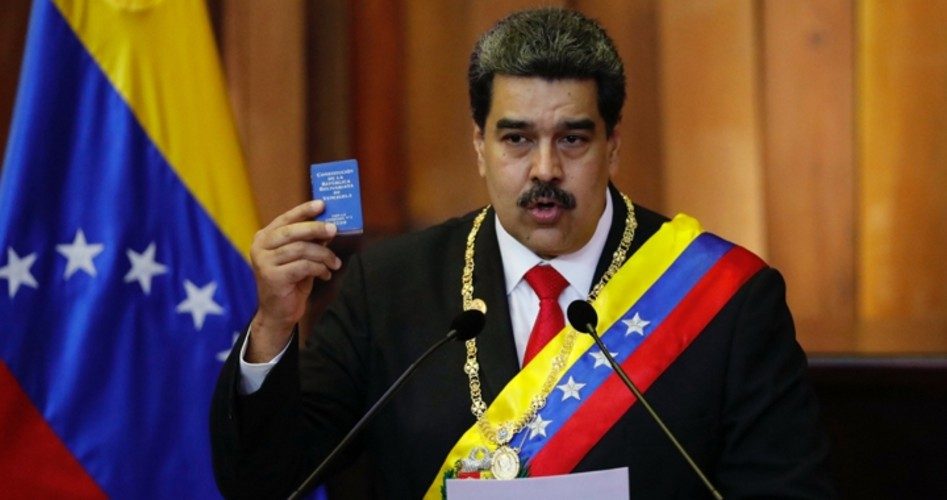
Venezuela’s Marxist President Nicolás Maduro was sworn in for a second six-year term on Thursday despite his presidency being declared null and void by 13 of Venezuela’s neighbors.
In all, about 60 countries have declared that his reelection in May was illegitimate owing to his quashing of his political opponents, his use of food as a political weapon to reward those who would vote for him, and the opposition party telling its voters to abstain from voting in the rigged election. Accordingly, in an election with the lowest voter turnout in the country’s history, Maduro was reelected with 68 percent of those who voted.
The New York Times asked, “So How Did Maduro Secure a Second Term” on Thursday. A better question might be, “Just How Long Might the Illegitimate Dictator Remain in Power?”
Human Rights Watch (HRW) said Maduro is using every means at his disposal to remain in power, including arrests and torture of suspected dissidents even among the military: “The Venezuelan government has brutally cracked down on members of the military accused of plotting against it. Not only are intelligence agents detaining and torturing members of the military, in some cases they are also going after their families or other civilians when they can’t find the suspects.”
Maduro’s crackdown extends far beyond the military. According to HRW, more than 12,800 civilians have been arrested since 2014, many of them tortured before being hacked to death in killing fields outside Caracas.
This is just one tool used by Maduro to cement himself into power. He has created a “parallel” legislature to replace the legitimate National Assembly required by the country’s constitution. He has replaced judges on the country’s Supreme Court with his cronies. He has given the military the power to operate the state-owned oil company PdVSA and to control the flow of food to the cities. He is rewriting Venezuela’s constitution. He even violated the country’s present constitution by ignoring its demand that he be sworn in by the National Assembly and instead was sworn in by his cronies on the Supreme Court.
To finance his country’s descent into tyranny, Maduro has enlisted the willing financial help from Russia and China, who see an opportunity to seize control of Venezuela’s vast oil reserves as collateral for upwards of $10 billion in loans. He is also relying on the continued export of an estimated 500,000 barrels of crude oil to U.S. Gulf Coast refineries daily, generating a much needed $25 million a day in cash from American drivers enjoying low gas prices.
The results of his turning Venezuela into a socialist command economy are predictable: Price controls have led to rationing and empty grocery-store shelves. Medicine and common daily paper products have all but disappeared. Foreign companies continue to leave the country, idling thousands of workers desperate to feed their families. The horrors of the socialist state have been reviewed ad nauseam elsewhere. Those who still can are leaving the country, with some 10 percent of the population already having left the country and another two million expected to leave in 2019.
So, how will Maduro’s regime of horrors, violence, and destruction end? He controls the military by giving them the opportunity to enrich themselves through favored distribution of food supplies. He rewards his administration by giving his officials access to the country’s currency controls machinery, allowing many of them to become rich beyond comprehension.
Just a few days before Maduro’s phony inauguration, U.S. officials applied sanctions against a number of his top people for running a drug-trafficking and money-laundering operation. One of them, Alejandro Andrade, Maduro’s former treasurer, is now serving a 10-year U.S. prison sentence after he pleaded guilty to taking more than $1 billion in bribes while he was in office.
According to the Wall Street Journal, such sanctions are supposed to “undermine political support [for Maduro’s regime] in Venezuela and any remaining international backing.” Said Treasury Secretary Steven Mnuchin, “Venezuelan regime insiders have plundered billions of dollars from Venezuela while the Venezuelan people suffer. The United States remains committed to holding accountable those responsible for Venezuela’s tragic decline, and will continue to use diplomatic and economic tools to support the Venezuelan people’s efforts to restore their democracy.”
So, how is that working? With inflation having effectively destroyed the value of the country’s currency, leaving an estimated 80 percent of the populace reduced to barter and living in abject poverty, who would mount resistance to the dictator? With roving bands of state-sanctioned motorcycle gangs “keeping order” in dissident communities, who would dare to risk their lives to oppose him?
The Cuban military has been invited in to support Maduro’s state police. Bolivia’s President Evo Morales, a fellow socialist, attended Maduro’s inauguration, while Mexico’s new leftist president, AMLO (Andrés Manuel López Obrador), invited Maduro to attend his own inauguration. Meetings last fall between Washington and military officials from countries surrounding Venezuela to talk about mounting a coup to replace Maduro went nowhere and gave Maduro another opportunity to attack the Trump administration for meddling in Venezuela’s internal affairs.
The question remains open as to how long Maduro will remain in power, and by what means he will be removed. For the time being, as long as he can continue to receive life support from China, Russia, and the U.S. oil industry, he could safely and successfully run for reelection a third time in 2025. After all, he is only 56 and isn’t likely to die of natural causes before then.
Photo: AP Images
An Ivy League graduate and former investment advisor, Bob is a regular contributor to The New American magazine and blogs frequently at LightFromTheRight.com, primarily on economics and politics. He can be reached at [email protected].
Related articles:
Five of Maduro’s Big Lenders Want Their Money Back. Good Luck
Maduro Claims Bolton Ready to Invade Venezuela
In Venezuela, You Even Have to Wait in Line to Leave
Venezuelan Oil Company Workers Quitting, Taking Parts of the Company With Them



